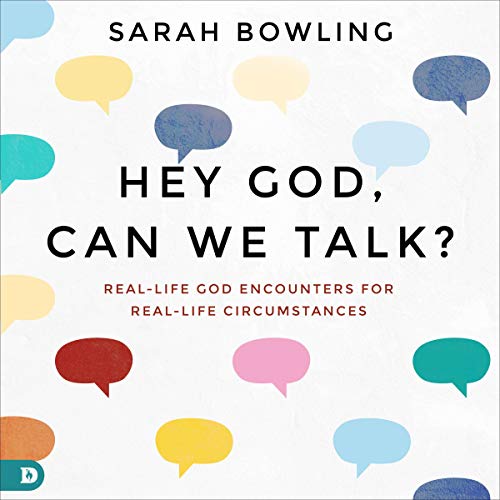“Hey God, Can We Talk?” with Sarah Bowling
Talking With God
“We don’t have conversations with God,” Sarah says, “as much as we have monologues.” She thinks that’s because of preconceived ideas of what prayer should be, and one’s religious upbringing. It’s her mission to help as many people as possible grow from having one-sided, distant, religious communication with the Lord to enjoying meaningful, authentic dialogues. Of the many books Sarah has written, Hey God, Can We Talk? is her favorite. “Because it’s the most relational and addresses what’s at the core of every human being: a desire for relationship.” Since we can’t see or hear God the same way we do one another, Sarah understands that many people feel uncomfortable trying to talk with Him. “For some people, having a conversation with God feels as foreign as attempting to talk with an alien.”
In illuminating what a conversation with God is, Sarah first defines it by what it is not. It’s not a monologue, command, or information download, though all of those are part of God’s communication with us in His Word. A conversation with Him, by contrast, is communication which goes back and forth in talking, listening, interaction, and dialogue. Because the idea of relating to God in these ways can seem difficult, Sarah offers many biblical examples of conversations with God, as well as many conversation starters to guide our efforts.
Job's Conversation With God
Sarah wants to encourage believers to talk with God not only when life is going well, but especially when it’s not. She acknowledges a number of such seasons in life, such as when we’ve really made a mess of things, when we’re at a fork in the road, when the future seems bleak, and when life is in meltdown, as was the case for Job. Sarah takes a close look at the conversation between Job and God laid out in Job 38-42 and finds several takeaways that can help us all: First, the acknowledgement that God does indeed allow seasons in life when it seems everything is falling apart and we are utterly overwhelmed. Second, the fact that God’s love for us doesn’t change according to our situations, no matter how painful or seemingly hopeless. “His character is more reliable than our circumstances,” she reminds us. And finally, in addition to God’s love, Sarah points to His sovereignty over every detail of Job’s trial and ours, as well as His presence, which He never withheld from Job and won’t from any believer.
Sarah notes that God asks Job more than 70 questions in their conversation. Of course, He knew all the answers, but she points out that God was clarifying Job’s perspective on his suffering, himself, and on God. She then suggests questions we can ask God, which He welcomes, and which express our hearts. Some of those are: Where are you in this circumstance? How are you demonstrating love in this situation? What are you saying to me through the conversation with that person?How can I know you better in this season?
Conversation Starters
There are a number of methods Sarah offers to help us get started in communicating with God: using specific Scriptures to guide our thoughts, praying while walking, exercising, or doing something creative, or meditating on the names of God. Another one she recommends is called “the Examen,” which comes from the Jesuit tradition, and helps the seeker focus on the presence and participation of God in his life. The five simple steps involved in the Examen are:
- Gratitude – reflection what one is grateful for in that day
- Review – look for God’s presence and fingerprints in the day’s events
- Sorrow – think on words, actions and attitudes over which we feel remorse
- Forgiveness – ask God’s forgiveness for what brings sorrow and regret
- Grace – ask God’s grace and the ability to see His presence more clearly throughout the day
As we take time to reflect in these ways, God will often bring ideas and truths to mind to help, guide, comfort, or directly answer our questions.







